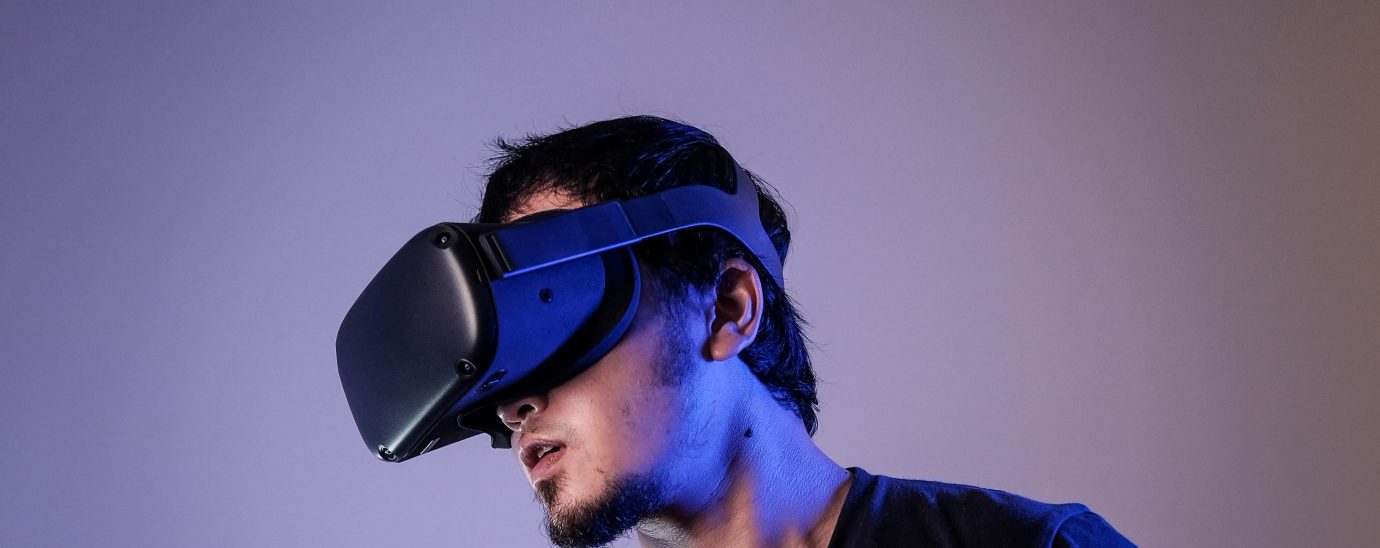The evolution of VR and AR

We look at how extended reality technologies VR and AR evolved from only gaming to slowly incorporating into other aspects of our lives.
Click here to listen to our podcast ‘The evolution of the virtual world’ now
Augmented Reality, Virtual Reality and Extended Reality originated in 1838 with Charles Wheatstone’s stereoscope, which used an image for each eye to create a 3D image. Ever since then, this technology has continuously grown and become more incorporated into our everyday lives. However, before we go into how AR, VR, and XR have extended into our lives, we need to understand what VR, AR, and XR are and their advantages and disadvantages.
XR
Extended Reality, also known as XR, is the umbrella term used for all immersive technologies, including Augmented Reality, Virtual Reality and Mixed Reality. All immersive technologies either allow you to experience a blending of the real and virtual worlds or a fully virtual and immersive world.
AR
Augmented Reality, also known as AR, allows for virtual items and information to be overlapped in the real world. The user can use AR glasses or even use any digital screens, such as smartphones and tablets. By using these items, the user is not isolated from the real world around them and can still interact with and see what is happening in front of them. The most well-known example of AR is the Pokémon GO game that overlayed digital creatures onto the real world or Snapchat filters that put digital objects such as hats or glasses onto your head.
Advantages
Some of the advantages of using AR include:
· Creating an enhanced experience: The main function of AR is to create a virtual experience within the real world.
· Easy to use: for the user, everyone who owns a smartphone, tablet, etc. can go through these immersive experiences. For the creator, it has become easier for them to create custom augmented reality apps tailored to their products to provide their customers with an interesting experience.
· Improving social interactions: By creating experiences where people can interact with each other, AR has helped improve their users’ stress, anxiety and depression.
· Learning and practice: Throughout 2020 and 2021, AR has helped students in school and universities learn new skills and experience new things. An example of this is a student studying medicine and giving them the experience of being in an operating room during surgery before they experience it in real life.
Disadvantages
Some of the disadvantages of using AR include:
· AR is expensive to execute: Due to the time and skills needed to create these worlds, the costs for small companies are simply too much to invest in.
· Privacy concerns: AR technology creates, analyses and collects vast amounts of data that could be seen as confidential.
· Creating addiction problems: AR has been known to create addiction problems with users using the platform for hours at a time. On top of addiction, various other medical concerns need to be considered, such as: eye problems, increased obesity levels, chronic pain, and psychological effects.
VR
Virtual Reality, also known as VR, completely immerses the user in a virtual world. For these experiences, users will need to use a VR headset to get the full 360-degree view of the virtual experience. This is a popular technology for the gaming and entertainment industry and is slowly making its way into various other sectors, such as medical, construction, and more.
Avantages
Some of the advantages of using VR include:
· Creates an interactive learning space: By using VR, students can practice their skills. For example, a medical student can practice doing surgery instead of just watching through AR.
· Improved cognitive functions: VR can assist the user in developing their thinking and decision-making skills. A new pilot may want to experience a hazardous situation in a VR world to learn and prepare for it to happen in the real world.
· Enhanced social interaction: With events cancelled around the world in 2020 and 2021, VR software developers have created a space where people can watch live coverage of the event in a virtual world. It helps people feel like everybody is in the same room.
Disadvantages
Some of the disadvantages of using VR include:
· Addiction: As with AR, there is the risk of addiction amongst VR users. This is especially dangerous as users conduct illegal activities in the real world that they may now take into the real world.
· Various effects on the user’s health: There is the possibility of VR causing loss of special awareness, dizziness, disorientation and nausea.
· loss of connections: This can occur when users rely on VR to conduct social interactions as they prefer it over real-life interactions.
Beyond the gaming industry
Now that we understand more about XR, AR and VR, let’s look at how it has evolved from gaming and entertainment to being incorporated into other industries.
AR has started to pop up in the retail industry to create new and exciting experiences for shoppers worldwide. From furniture stores and paint brands to clothing and makeup, new AR experiences allow shoppers to try before buying from their home’s safety and comfort. Brands such as Sephora have created an App that allows their customers to try makeup before deciding what products to buy. Virtual fitting rooms have become more popular over the last few years as many customers have not been able to go into stores to try clothing on, but now they can do it straight from their mobile devices. Outside of the fashion industry, customers can now test paint colours and pieces of furniture in their homes through their mobile devices before deciding what items/colours to go with. VR has also jumped into the retail industry during the Covid-19 pandemic. John Lewis, a high-end department store, created a Christmas shop for the end of 2020. Customers could walk around the Oxford Street shop and browse various decorations, table settings and homeware pieces. Customers could then go onto the John Lewis website or pop into the store and purchase the items they chose through their VR experience.
AR has been involved in events for a while, but recently it has been taken to another level. As mentioned in a previous podcast, The 2021 BAFTAs showcased an avatar music performance from Liam Payne in real-time augmented reality technology, using 5G facilities. Viewers made use of 3D AR animation and watched the live performance through ‘The Round’ app found on smartphones. Various sporting events have also included VR experiences to improve the overall experience of their attendees. VR has also become more popular in this industry due to the Covid-19 pandemic. Hundreds of thousands of conferences were cancelled during this period, and a new experience needed to be created. A few conferences have created a VR experience for their attendees, who can now feel as if they were in the venue.
AR has been used in the training and education industries in various ways. AR is helping students with various aspects of their studies such as reading, working with numbers, spatial concepts, content creation, real-life environments & scenarios. With schools closing during the covid-19 pandemic, teachers interacted with their students and created awesome field trips to ensure their students didn’t feel isolated. Universities and training programmes have used AR to allow them to understand and view certain situations. For example, medical students can experience what it is like in the operating room, and pilots can sit in the passenger seat to experience an emergency. VR has also been incorporated into various training simulations. Medical students/interns can now experience surgery without the worry of harming a patient, and pilots can experience an emergency where they will need to deal with the situation to virtually save the plane.
AR has also been adapted into the navigation industry. Users can now navigate their way around indoor areas; MobiDev’s ARKit and ARCore based applications aid consumers in finding their way through airports, shopping malls, and other locations. In addition, in-store navigation stands to improve greatly from advances in AR technology. This can help customers find exactly what they are looking for while shopping in person.
AR has also made a massive impact in the automotive industry and has allowed brands to provide different ways of creating the purchasing process and how they learn to drive. For example, if a customer wants to purchase a BMW but can’t go through to the dealership, the dealership can now come to you. Customers can now view the various BMW models in different colours in their driveways by using AR. Another use of AR in the automotive industry is when drivers learn to drive and prepare them for various situations where objects appear on the road. VR has also become an integral part of the automotive industry as it will actively contribute to helping self-driving vehicles reach new heights.
READ MORE:
- Transforming the learning experience through VR
- Revolutionising education with VR and intelligent platforms
- Hong Kong students develop powerful VR game
- How Augmented Reality Can Improve Efficiency in Transportation
In closing, even though XR, AR and VR started mostly in the gaming industry, various industries have started implementing this into their experiences. With awesome technology comes awesome experiences, and we can agree that XR, AR and VR are pretty awesome.
Click here to discover more of our podcasts now
For more news from Top Business Tech, don’t forget to subscribe to our daily bulletin!
